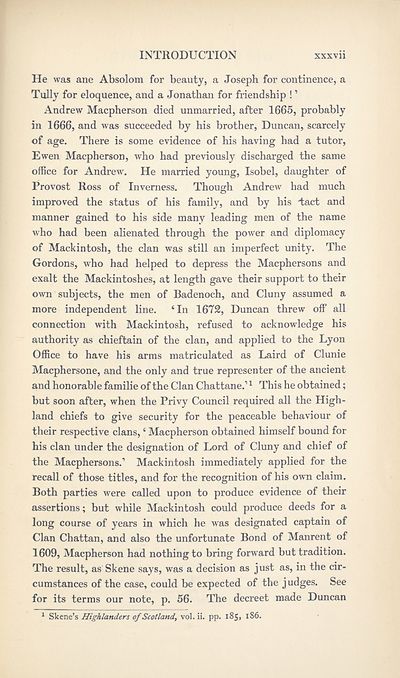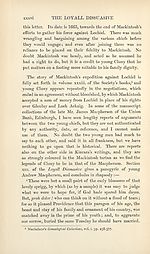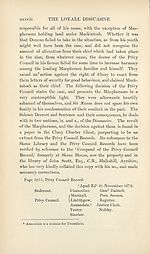Series 1 > Loyall dissuasive
(52) Page xxxvii
Download files
Complete book:
Individual page:
Thumbnail gallery: Grid view | List view

INTRODUCTION
xxxvn
He was ane Absolom for beauty, a Joseph for continence, a
Tally for eloquence, and a Jonathan for friendship !1
Andrew Macpherson died unmarried, after 1665, probably
in 1666, and was succeeded by his brother, Duncan, scarcely
of age. There is some evidence of his having had a tutor,
Ewen Macpherson, who had previously discharged the same
office for Andrew. He married young, Isobel, daughter of
Provost Ross of Inverness. Though Andrew had much
improved the status of his family, and by his "tact and
manner gained to his side many leading men of the name
who had been alienated through the power and diplomacy
of Mackintosh, the clan was still an imperfect unity. The
Gordons, who had helped to depress the Macphersons and
exalt the Mackintoshes, at length gave their support to their
own subjects, the men of Badenoch, and Cluny assumed a
more independent line. ‘In 1672, Duncan threw off all
connection with Mackintosh, refused to acknowledge his
authority as chieftain of the clan, and applied to the Lyon
Office to have his arms matriculated as Laird of Clunie
Macphersone, and the only and true representer of the ancient
and honorable familie of the Clan Chattane.’1 This he obtained;
but soon after, when the Privy Council required all the High¬
land chiefs to give security for the peaceable behaviour of
their respective clans, ‘ Macpherson obtained himself bound for
his clan under the designation of Lord of Cluny and chief of
the Macphersons.’ Mackintosh immediately applied for the
recall of those titles, and for the recognition of his own claim.
Both parties were called upon to produce evidence of their
assertions; but while Mackintosh could produce deeds for a
long course of years in which he was designated captain of
Clan Chattan, and also the unfortunate Bond of Manrent of
1609, Macpherson had nothing to bring forward but tradition.
The result, as Skene says, was a decision as just as, in the cir¬
cumstances of the case, could be expected of the judges. See
for its terms our note, p. 56. The decreet made Duncan
1 Skene’s Highlanders of Scotland, vol. ii. pp. 185, l86.
xxxvn
He was ane Absolom for beauty, a Joseph for continence, a
Tally for eloquence, and a Jonathan for friendship !1
Andrew Macpherson died unmarried, after 1665, probably
in 1666, and was succeeded by his brother, Duncan, scarcely
of age. There is some evidence of his having had a tutor,
Ewen Macpherson, who had previously discharged the same
office for Andrew. He married young, Isobel, daughter of
Provost Ross of Inverness. Though Andrew had much
improved the status of his family, and by his "tact and
manner gained to his side many leading men of the name
who had been alienated through the power and diplomacy
of Mackintosh, the clan was still an imperfect unity. The
Gordons, who had helped to depress the Macphersons and
exalt the Mackintoshes, at length gave their support to their
own subjects, the men of Badenoch, and Cluny assumed a
more independent line. ‘In 1672, Duncan threw off all
connection with Mackintosh, refused to acknowledge his
authority as chieftain of the clan, and applied to the Lyon
Office to have his arms matriculated as Laird of Clunie
Macphersone, and the only and true representer of the ancient
and honorable familie of the Clan Chattane.’1 This he obtained;
but soon after, when the Privy Council required all the High¬
land chiefs to give security for the peaceable behaviour of
their respective clans, ‘ Macpherson obtained himself bound for
his clan under the designation of Lord of Cluny and chief of
the Macphersons.’ Mackintosh immediately applied for the
recall of those titles, and for the recognition of his own claim.
Both parties were called upon to produce evidence of their
assertions; but while Mackintosh could produce deeds for a
long course of years in which he was designated captain of
Clan Chattan, and also the unfortunate Bond of Manrent of
1609, Macpherson had nothing to bring forward but tradition.
The result, as Skene says, was a decision as just as, in the cir¬
cumstances of the case, could be expected of the judges. See
for its terms our note, p. 56. The decreet made Duncan
1 Skene’s Highlanders of Scotland, vol. ii. pp. 185, l86.
Set display mode to:
![]() Universal Viewer |
Universal Viewer | ![]() Mirador |
Large image | Transcription
Mirador |
Large image | Transcription
Images and transcriptions on this page, including medium image downloads, may be used under the Creative Commons Attribution 4.0 International Licence unless otherwise stated. ![]()
| Scottish History Society volumes > Series 1 > Loyall dissuasive > (52) Page xxxvii |
|---|
| Permanent URL | https://digital.nls.uk/127547629 |
|---|
| Attribution and copyright: |
|
|---|
| Description | Over 180 volumes, published by the Scottish History Society, containing original sources on Scotland's history and people. With a wide range of subjects, the books collectively cover all periods from the 12th to 20th centuries, and reflect changing trends in Scottish history. Sources are accompanied by scholarly interpretation, references and bibliographies. Volumes are usually published annually, and more digitised volumes will be added as they become available. |
|---|


